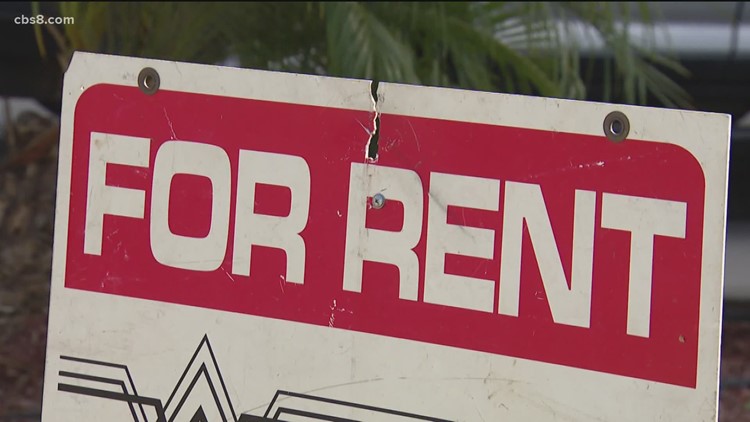SAN DIEGO COUNTY, Calif. — The San Diego City Council extended an eviction moratorium for renters and small businesses Tuesday to assist residents during the ongoing COVID-19 pandemic.
The pair of ordinances to extend the existing moratorium -- one for renters and one for commercial tenants -- were proposed by Mayor Todd Gloria last week with the intent to protect public health and speed the city's economic recovery.
Under the local ordinances, qualifying tenants cannot be evicted for unpaid rent due to financial hardship related to the pandemic accrued during the period starting Monday and ending 60 days after the city's COVID-19 emergency declaration ends. For residential tenants, any unpaid rent that accumulates during this period and is not repaid will be converted to consumer debt.
"Getting through this pandemic, financially and emotionally, is hard enough for residents and small businesses. The last thing they need to worry about is being evicted," Gloria said after the vote. "I thank the City Council for partnering with me to ensure that San Diegans won't lose their home or their storefront because they couldn't make the rent due to COVID-19. We will get through this together, and we will build back better."
The eviction ban for residential tenants will remain in effect until 60 days after the emergency declaration is lifted. The protections for commercial tenants will remain in effect through the same time period or through June 30, whichever comes first. The city's emergency declaration will be lifted after California's emergency declaration ends.
"We must protect our residents and small business owners who continue to be hurt by the pandemic as a result of former President Trump's bungling of the rollout of the vaccine," City Councilman Raul Campillo said. "Especially given the fact that we are already facing a homelessness crisis in our city, it is unjustifiable to possibly throw anyone out on the streets."
Residents and businesses remain responsible for any unpaid rent or lease payments. Tenants and landlords are encouraged to work out repayment plans. Tenants must contact their landlords within seven days of the rent due date in order to qualify for protection. Landlords then have seven days to ask for evidence of economic hardship. Residential tenants then have 14 days and commercial tenants seven days to respond with documentation.
Affected businesses would have six months from the end of the commercial eviction moratorium to make any outstanding payments. Qualifying businesses are those that employed fewer than 100 people in late February last year, had tax receipts of less than $3 million and had a valid San Diego business tax certificate.
Councilman Joe LaCava said he wanted the city to expand outreach to help people navigate the city's bureaucracy to get money into the hands that need it.
Dozens of callers and more than 100 written public comments urged the council one way or another on these ordinances. Many landlords urged the council to reject the extension of the eviction moratorium.
The commercial ordinance passed unanimously and Councilman Chris Cate was the sole no vote on the residential ordinance. He cited the timing of the vote -- near the end of the month, when rent is due -- as one of the issues giving him "heartburn" on the vote.
Other councilmembers were sympathetic to local landlords as well.
"It's not a perfect ordinance. It's a terrible situation," Council President Pro Tem Stephen Whitburn said. "I hope that we can make property owners more whole going forward."
Some callers urged the council to do more.
"Lives are at risk and in your hands," said Nancy Nguyen, civic engagement officer of the immigrant-focused nonprofit Partnership for the Advancement of New Americans. She urged the council to cancel rent, provide rent relief and increase tenant legal services.
Rafael Bautista of the San Diego Tenants Union said the issue was the commodification of housing under capitalism and said leadership was out of touch with the working class during the crisis.
"The government needs to step up with our money," he said.
Pending state legislation, Senate Bill 91 and Assembly Bill 80, would extend current statewide eviction protections for residential tenants through June 30. The Legislature is expected to vote on the bill this week. If adopted, the state law would take precedence over the local residential eviction moratorium adopted by the council Tuesday, which would instead go into effect on July 1, or whenever state protections expire.
Mayor Gloria announced last week that the city has received $42.3 million in federal funding to provide financial assistance to cover unpaid rent and utilities for qualifying residential households affected by COVID-19. This funding will be distributed through a program administered by the San Diego Housing Commission, and details on eligibility and the application process will be forthcoming.
Last year, the city created programs that distributed more than $15 million in assistance for residential renters and nearly $19 million for small businesses.
San Diego City Council extends eviction moratorium for tenants, small businesses
"Getting through this pandemic, financially and emotionally, is hard enough for residents and small businesses, "Gloria said after the vote.



